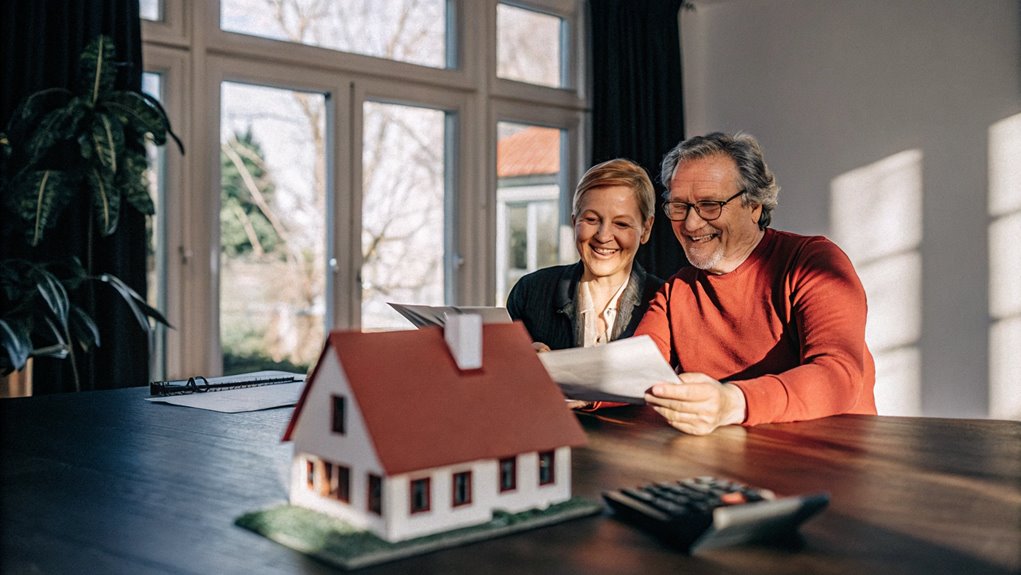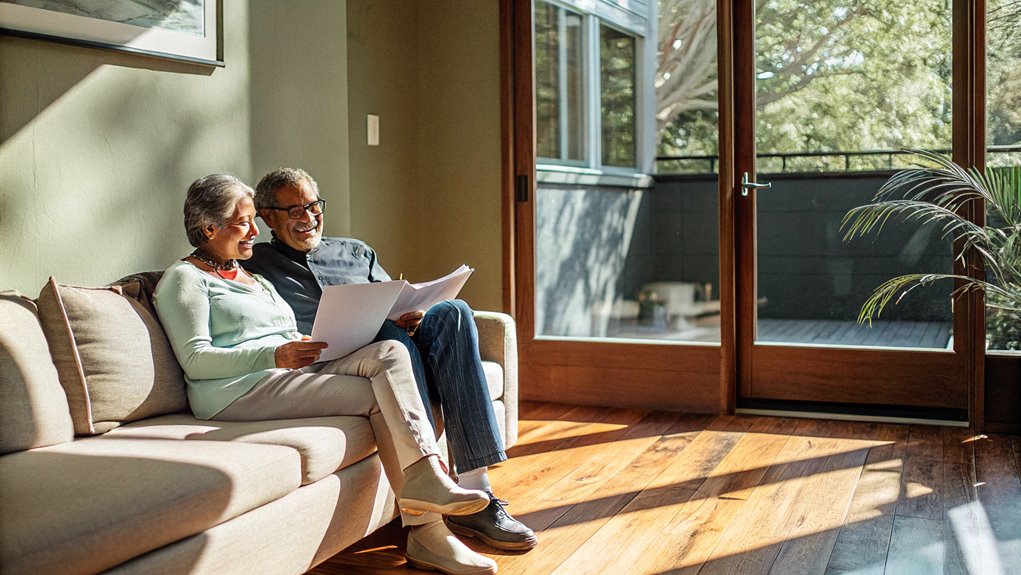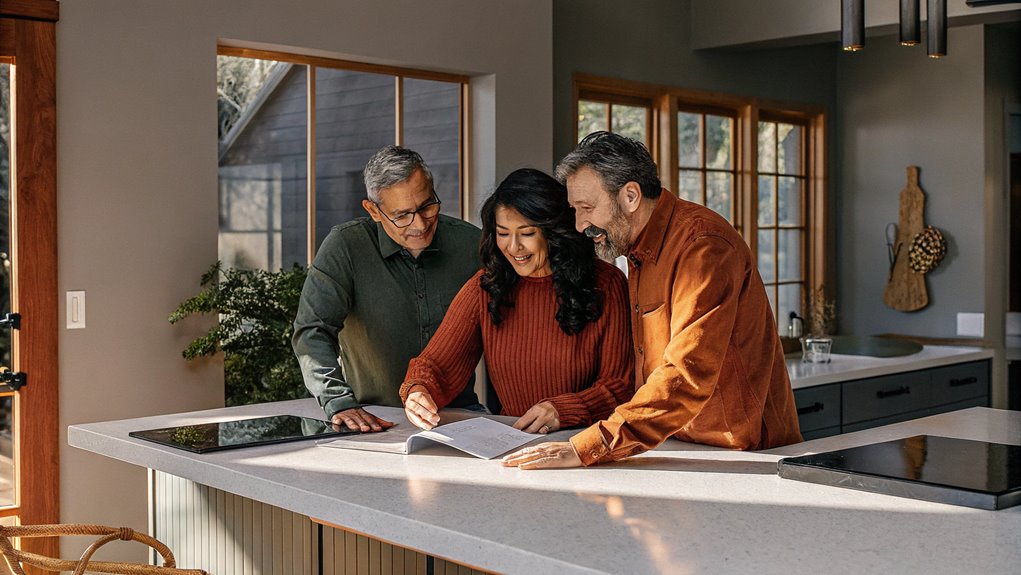Your home has money locked inside it, and you can get it out without a HELOC loan. Let's look at some easy ways to do this.
You can get a simple home loan. These loans have the same rate that stays the same each month. Or you can get a new, bigger loan to replace your old one.
Some people share their home's future value with others to get cash now. You don't have to pay each month for this.
If you like, you can sell your home but keep living in it as a renter. For older people over 62, special loans called reverse loans let you use your home's value.
The government also has ways to help you tap into your home's worth. Each way to get your home's money is different, so pick what works best for you.
Home Equity Loans

You can get money from your home by using what's called a home equity loan. Think of it like getting cash from your house. You get all the money at once, then pay it back each month for 5 to 30 years.
The good news is you know what you'll pay each month. The rate stays the same and is often less than what you'd pay on credit cards. If you use the money to make your home better, you might pay less in taxes too.
But be careful. Your house is like a promise that you'll pay the money back. If you can't pay, you could lose your home.
You also need to pay extra fees when you get the loan. These fees cost about $2 to $5 for every $100 you borrow. Before you say yes, make sure you can afford the monthly payments.
Cash-Out Refinancing
Want to get cash from your home? You can do this with cash-out refinancing. It works like this: You get a new, bigger loan to replace your old one. The extra money comes to you in cash.
To see how much cash you can get, look at how much your home is worth now. Then subtract what you still owe on it. This tells you your home equity.
Before you decide, check the new loan rates. Compare them to what you pay now. Remember, the new rate will be for all the money you borrow, not just the extra cash.
Most banks want you to keep at least 20% of your home's value after you take the cash. This helps keep you and the bank safe.
Understanding Cash-Out Basics
When you do a cash-out on your home, you get a new loan that's bigger than your old one. You get to keep the extra money to spend on things like fixing up your home or paying off bills.
To get approved, you need three main things. First, you must still own at least 20% of your home after getting the new loan.
Next, you need a good credit score of 620 or more. Last, you need to show you have a steady job with good pay. Your bills shouldn't take up more than 43% of what you make each month.
The bank will look at how good you're with money to decide what rate to give you.
Think hard about what you'll do with the money since your home is at risk if you can't pay it back.
Comparing Interest Rate Options
When you get cash from your home through refinancing, you'll pay more in interest. This is because banks see it as more risky. Your credit score, how much you want to borrow, and your bills all help set your rate.
Shop around and get rates from at least three banks. Look at both fixed rates and rates that can change. If you plan to move soon, a rate that can change might save you money at first. Many people like fixed rates because they know what they'll pay each month, mainly when rates are going up.
Remember you'll need to pay fees to get your new loan. These fees often cost between 2 and 5 cents for every dollar you borrow.
Think about these costs when you figure out if getting cash from your home is worth it.
Calculating Available Home Equity
Want to know how much money you can get from your home? Let's find out together.
Most banks will let you borrow up to 80% of what your home is worth. But first, you need to subtract what you still owe on your home loan.
Here's a simple way to see how it works:
| What We Look At | Numbers | How We Get It |
|---|---|---|
| Your Home's Worth | $400,000 | This is what your home is worth now |
| Bank's Limit (80%) | $320,000 | $400,000 x 0.80 |
| What You Still Owe | $250,000 | Take this away |
Let's do the math:
- Take your home's worth and times it by 0.80
- Then take away what you still owe
Using our example, you could get $70,000 from your home ($320,000 – $250,000).
Remember: The bank will look at your bill-paying history and how much money you make before they say yes. They will also check your credit score.
Shared Equity Agreements

Want to share your home's value with someone else? A shared equity deal lets you get money now by trading part of what your home will be worth later.
Think of it like having a partner who gives you cash today and gets a piece of your home's future value. Your partner will look at things like your credit score and how much you owe. They want to make sure you're a good fit before they say yes.
The split you get depends on what your home is worth now and how much money you need.
Understanding Equity Share Basics
Getting money from your home is easier with equity sharing. You don't need to take a loan or make monthly payments. Instead, you get cash now and share some of your home's growing value later.
Simple Compare:
- Regular Loan: You pay each month
- Equity Share: No monthly bills
- Regular Loan: You pay interest
- Equity Share: No interest
- Regular Loan: Big credit check
- Equity Share: Small credit check
- Regular Loan: Keep all home value
- Equity Share: Split future value
- Regular Loan: Fixed time to pay
- Equity Share: More time choices
You can get 10-30% of what your home is worth today. Later, you share 20-40% of how much more your home is worth. Most deals last 10-30 years.
You can end it early if you want to pay the share back. The home stays yours – you live there and take care of it just like before.
Calculating Your Share Split
Your home is like a piggy bank that grows over time. When you share it with someone else, you need to know how much of that growth each person gets.
First, find out what your home is worth now. Take away what you still owe on it. This shows how much money you have in your home right now.
Next, pick how much of your home's growth you want to share. Most people share between 15 and 40 out of every 100 dollars of growth.
Think about how long you want to share. This can be from 10 to 30 years. Make sure this fits with your money plans.
Look at how much homes in your area might grow in value. Keep enough of the share for yourself so you can still make money as your home grows in value.
Investment Partner Requirements
We want to help you share your home's value with an investment partner. You need a few things first:
Your money and credit:
- A credit score of 620 or higher
- Less money going out than coming in
- Own your home for 6 months or more
- Own at least 20% of your home's worth
Your home must:
- Be where you live most of the time
- Have no loans or problems with its title
- Have good home insurance
- Have all taxes paid up to date
You also need:
- A steady job
- No open bankruptcies
- No past foreclosures
Someone may need to check your home to make sure it's in good shape.
They want to know the home is strong and safe before they invest with you.
Personal Loans
Getting money when you need it doesn't mean you have to use your home. A personal loan is money you can borrow without using your house as backup. You might pay more in fees, but you get your money fast and your home stays safe.
Personal loans are simple:
- You can get your money in just a few days
- You don't need anyone to check your house
- You know exactly what you'll pay each month
To get a loan, banks look at:
- How much money you make
- If you pay your bills on time
- How much you owe
You can ask for loans at your local bank, credit union, or on the internet. Each place has its own rules and costs. Look at many places before you pick one. This helps you find the best deal.
Reverse Mortgages

Want to use your home to get money? If you're 62 or older, a reverse mortgage can help. You get to stay in your home and don't have to make monthly payments. You can get your money all at once, each month, or when you need it.
You still need to take good care of your home. You must pay taxes on it and keep insurance. The money you borrow grows over time as it adds interest.
But don't worry – you'll never have to pay back more than what your home is worth.
Most reverse mortgages are backed by the FHA. They make sure you're safe and get good advice before you start. The loan only needs to be paid back when you move out, sell your home, or die.
Sale-Leaseback Options
Want to stay in your home but need money? A sale-leaseback might help. This means you sell your home but don't move out. Instead, you become a renter in the same house.
Here's how it works:
- You get cash for your home
- You sign a lease to keep living there
- You pay rent each month
- You can stay 1-5 years
- You might be able to buy your home back later
The rent you pay will be like what others pay in your area. You and the buyer can talk about the amount before you agree.
Think hard about this choice. Ask yourself:
- Do I want to rent instead of own?
- How long do I want to stay here?
- Would a home loan work better for me?
Look at all your choices before you pick this path. Make sure it fits what you need for your future.
Government Loan Programs

Getting money from your home doesn't mean you have to sell it. The government has special loans that can help you. If you own a home, you can use these loans to get cash from it while you still live there.
You can get an FHA loan if your credit isn't perfect. This lets you get up to 80% of what your home is worth. If you served in the military, you can get a VA loan for all of your home's worth.
These loans are often better than bank loans and cost less. You must show you make enough money to pay the loan back each month. Your home will be used to back up the loan, just like a normal house loan.
Home Equity Investments
Your home is special. It's worth money, even if you still live there. Today, you can get cash from your home in a new way. You don't need to get a loan.
Here's how it works: A company gives you money now. In return, you share some of the money your home makes when it grows in value. You still own your home. You just share some of the profits later.
Good things about this choice:
- You don't pay each month like a loan
- You can wait 10-30 years to pay back
- You can use the money for anything you want
This works best if you plan to stay in your home for a long time. It also works well if you think your home will be worth more in the future.
When you sell your home, you pay back the money plus a share of how much more your home is worth. Or you can buy out the deal early if you want to keep your home.







